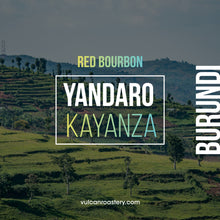BURUNDI
YANDARO - WASHED

FARM: Yandaro Washing Station
VARIETAL: Red Bourbon
PROCESSING: Fully Washed
ALTITUDE: 1,775 to 1800 meters above sea level
PRODUCER: Various Farmers
REGION: Yandaro, Kayanza
TASTING NOTES: Redcurrant, Milk Chocolate, Green Apple
Stationed near the rainforest and a large river, Yandaro station is in a very strategic location within a high-potential coffee region.

ABOUT THIS COFFEE
Yandaro station sits close to the border with Rwanda, in the Kayanza province. Both countries share special growing conditions in the corridor that connects the south of Rwanda to the north of Burundi. This region produces many of our favorite coffees both in Rwanda and Burundi.
The washing station is in the valley where the eponymous Yandaro River runs. The growing area around the station benefits from being close to the Kibira Rainforest. A rainforest helps maintain groundwater reserves and adequate nutrition levels in the soil for the region surrounding it. Stationed near the rainforest and a large river, Yandaro station is in a very strategic location within a high-potential coffee region.
The station serves 2,341 local coffee producers from 22 hills around the station. The average altitude in the area is 1,800 meters above sea level. Yandaro processes more than 1,200 metric tons of coffee throughout the harvest season. The region has a mild climate with average temperatures between 18 and 25° Celsius, depending on the altitude.
The washing station participates in several farmer outreach and support projects, including a livestock rearing project and a range of Farmer Hub projects centered on strengthening cooperatives and improving yields.

CULTIVATION
Many trees in Burundi are Red Bourbon. Because of the increasingly small size of coffee plantings, aging rootstock is a very big issue in Burundi. Many farmers have trees that are over 50 years old, but with small plots to farm, it is difficult to justify taking trees entirely out of production for the 3 to 4 years it will take for the new plantings to begin to yield. To encourage farmers to renovate their plantings, Greenco purchases seeds from the Institut des Sciences Agronomiques du Burundi (ISABU), establishes nurseries, and sells the seedlings to farmers at or below cost. At the washing station, farmers can also get organic fertilizer made from composted pulp.
Despite the ubiquity of coffee growing in Burundi, each smallholder produces a relatively small harvest. The average smallholder has approximately 250 trees, normally in their backyards. Each tree yields an average of 1.5 kilos of cherries so the average producer sells about 200 to 300 kilos of cherries annually.

HARVEST & POST-HARVEST
During the harvest season, all coffee is selectively hand-picked. Since most families only have a few hundred trees, harvesting is done almost entirely by the family.
Quality assurance begins as soon as farmers deliver their cherries. Cherry is wet-processed under constant supervision. All cherry is floated in small buckets as a first step to check quality. After floating, the higher quality cherry is sorted again by hand to remove all damaged, underripe, and overripe cherries.
Once sorted, cherry is pulped within 6 hours of delivery. The station’s pulper can process up to 3 tons of cherries per hour. During pulping, cherry is separated into high- and low-grade by density on a Mackinon 3-disc pulper outfitted with an additional separation disk. The coffee is then fermented for 10 to 12 hours in clean water from a nearby stream. Following fermentation, coffee is run through washing and grading canals to remove any remaining mucilage and to separate beans by density.
Parchment is transported to the drying tables where it will dry slowly for 2 to 3 weeks. Pickers go over the drying beans for damaged or defective beans that may have been missed in previous quality checks. Each table has a traceability tag with the lot info. Drying parchment is stirred regularly and any parchment with visual defects is removed.
 ABOUT BURUNDI
ABOUT BURUNDI
Burundi has long been overlooked in comparison to its neighboring East African specialty coffee-producing powerhouses. However, Burundi season, for us, is one of the highlights of the annual coffee calendar. The country’s coffee is produced almost entirely by smallholder farmers, and much of this small-scale production is of exceptional quality. With its super sweet, clean, and often floral coffees, Burundi, every year, is increasingly putting itself on the specialty coffee map.
Coffee is of paramount importance to families and the country at large. Considering this, improving and expanding coffee infrastructure is not just a way to improve incomes; it is a way to revolutionize the earning potential of an entire nation.
Building washing stations and expanding agricultural extension work can be great ways to improve coffee quality. Washing stations are pivotal in improving cup profile standards and the global reputation of Burundian coffee.
Both state-owned and private actors drive Burundi’s coffee industry and play key roles as washing station management companies and exporters. State-owned companies are called Sogestals, short for “Sociétés de Gestions des Stations de Lavage” (Washing station management companies). Privately-owned companies can operate under a variety of different names.









